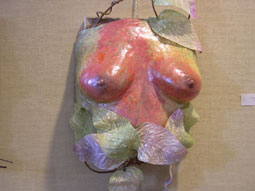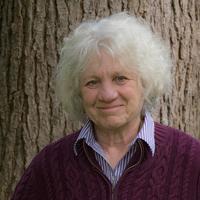
Vanessa Turke found a lump in her breast when she was 27 and pregnant--six weeks away from due date. Though the biopsy indicated that the lump was probably benign, the surgeon offered to remove it anyway. But Turke wasn't worried by it and wanted to avoid unnecessary surgery. She declined the offer.
A year later, the tumour had grown to six centimetres and was no longer benign. Turke had a mastectomy in January 2003.
"Having cancer," Turke says, "was like sailing to a bizarre place where you don't know how to feel. You have the sensation of being lost."
Turke had no formal training in art, but she had designed costumes for the theatre and had experimented with decorative arts. She decided to create a couple of collages to help her make sense of what had happened. She was determined to draw meaning from what she describes as "my trip to Cancerland." Her project grew. "The images kept coming; there were more than I could put in one or two collages. I experienced a paradigm shift. I had always been interested in art, but I felt that I didn't have much to say. Now suddenly, I had a lot to say." The result is a collection of sculptures and collages, "Cancer-Xancer."
'Can't make ugly art'
Though her subject matter is grim, Turke approaches it with whimsy and much humour. She delights in visual puns. At first glance, the background of a piece called "The Alchemist" appears to be wallpaper. But when you examine it closer, you find that the pattern is actually made up of percentages--a reference to the statistics that all cancer patients worry about. What's the likelihood of survival: 10 percent, 20 percent, 50 percent? Look at the frame of another piece called "Ductal Carcinoma," and you discover that it's made of duct tape.
Another surprising aspect of Turke's work is that it is easy on the eyes, aesthetically pleasing. She says, "I can't make ugly art. I think if what you are looking at is beautiful, you can go further into the subject. I also think that when something is shocking and beautiful at the same time, it's confusing. I like that."
Appropriately enough, Turke sculpts with plaster cast--the material doctors use to make casts for broken limbs. It is both pliable and strong. To get the anatomically correct shape of the women's breasts that appear in her work, Turke uses her friends as models. She covers their bodies with plaster and gauze, removes the mold and finishes it to get the textures she wants.
When you say the title of Turke's recent series, Cancer Xancer, out loud, it sounds like "Cancer's Answer." Turke says the answer to cancer is to speak about it. Turke had her premier showing at The Young and the Breastless, a national networking event for young survivors of breast cancer. Turke helped to organize the UBC conference that ran May 15 and 16th, the first of its kind in Canada.
Young women and cancer
Though the risk of breast cancer increases with age, about 100 women between 20 and 29, and a 1000 between 30 and 39, will be diagnosed with the disease this year in Canada. The problems that young women face are very different from those of older women. If they don't have children, maintaining their fertility may be a priority. This makes chemotherapy even more stressful than usual since it can bring on early menopause. The treatment for breast cancer can also cause younger women to lose sexual intimacy. Often one of the most distressing effects of the treatment, this loss has up until now, received little public attention.
"I learned more in this past year of suffering," Turke says, "than in all the rest of my life." Like a mythological heroine who makes a terrifying journey to the underworld and returns with a valuable prize, Turke feels she has been given a gift. "If you had asked me, before all this happened, whether I would trade a breast for courage, for inspiration, for being able to live the way I'd always wanted to live, I would have said, 'yes.'"
Claudia Cornwall, whose last piece for The Tyee was about a rare exhibit of Holocaust photos, is a freelance writer based in North Vancouver. Her family memoir about the Holocaust, A Letter from Vienna won the 1996 Hubert Evans BC Book Prize for best non-fiction. ![]()















Tyee Commenting Guidelines
Comments that violate guidelines risk being deleted, and violations may result in a temporary or permanent user ban. Maintain the spirit of good conversation to stay in the discussion.
*Please note The Tyee is not a forum for spreading misinformation about COVID-19, denying its existence or minimizing its risk to public health.
Do:
Do not: